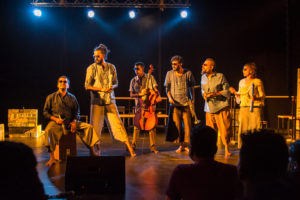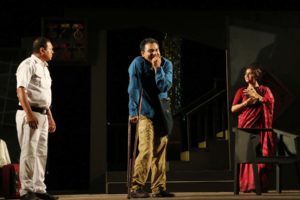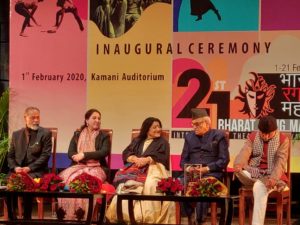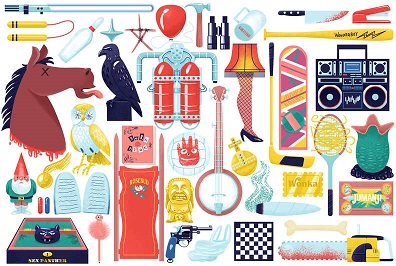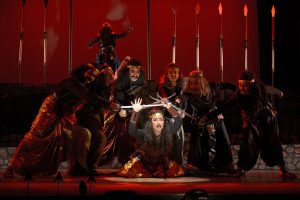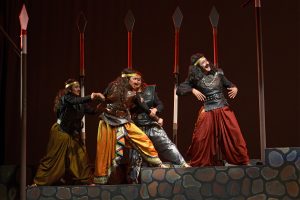Arijit Biswas & Prithunanadan Ghose’s Play: Priyotamasu
Playwright: Arijit Biswas & Prithunandan Ghose
Director: Prithunandan Ghose
Group: Bachhor Koori Porey, Kolkata
Language: Bengali
Duration: 2 hrs 15 mins
The Play
Priyotamasu is a chronicle of ten turbulent months in 1942. Set in a small mofussil town of Central India, the story is woven around a family of affluent Bengali settlers and a group of old or invalidated British officers, who are posted in that town. Away from the swirling passions of time, the two groups closely interact with each other till time overtakes them and the symbiosis is broken.
Director’s Note
Inspired from a short story by Somerset Maugham, which I read in late eighties, I couldn’t stop myself exploring how the drama in it could be brought on stage? I shared it with my childhood friend Arijit Biswas, co-playwright in this case, and asked him to read it as well. We had a series of debates on the context, the perspective and its acceptability by our viewers etc., which used to end up in tussles.
Finally, we had to change the whole of it completely, keeping only the essence of the outcome intact, and as such it took the shape of an original creation. We named it, Priyotamasu, the beloved.
A reading session was arranged for our acting and technical team who were awestruck listening to it and enjoyed all the rehearsals till it was launched on the evening of 1st June, 2019 at Gyan Manch, Kolkata.
As a Director of the play, I would not like to add any attribute, whatsoever, in favour of the play. Let the play be staged, it would be capable enough to substantiate its merit through its presentation.
The Director & Co-Playwright
Prithunandan Ghose’s approach to theatre is an amalgam of science and art. His presentations are uncanny and aesthetic owing to a background of engineering and the passion for theatre. His first group, Kathik, performed till 1977. When the group dissolved due to other professional callings for a living, he could not reconcile with his staying away from theatre. He formed Bachhor Koori Porey, which means ‘after 20 years.’ In 2015 the same compatriots, re-grouped for a sensational production, Ebong Andhokar, and in the following year for Adhora, a play scripted from a novel of Neelohit. In 2019 the group produced Priyotamasu that has been highly acclaimed. In all these plays Prithunandan has proven himself as a script-writer, lyricist, director and designer.
The Co-Playwright
Arijit Biswas, a writer of repute, is a graduate in engineering from Jadhavpur, and a post graduate in management from XLRI, Jamshedpur. Despite his professional demands he found time to write plays. He has co-written two Bengali plays viz. Priyotamasu and Ebong Andhokar that have been appreciated in and around Kolkata. Another play, Uttordroho, written by him was published in 1996 issue of theatre journal, Gandharba. He has written scripts and serials in Hindi for Zee TV, and for telefilms in Bengali. He is also the script-writer for Bollywood films Agent Vinod, Badlapur and Andhadhun. Under the section of Indian Feature Films category at KIFF, 2018, he won the best director award for the Bengali film Surjo Prithibir Chardike Ghore.
The Group
After a long break the group Kathik reassembled as Bachhor Koori Porey to perform Ebong Andhokar in 2015. The play was presented at important theatre congregations, mesmerizing the audiences and critics alike. Then followed Adhora, in 2016, and after three years, in June 2019, Priyotamasu. The latter has been a much awaited and promising piece that instantly caught the discerning attention of viewers and has now been invited to perform at NSD.
Cast & Credits
Sumi Aishani De
Aloka Amrita Mukhopadhyay
Surya Dipyaman Chatterjee
Doglus Sudip Mukherjee
Parsu Kunal Sen
Mr. Mahendra Banerjee Biswarup Das Purakayastha
Mrs. Sarbani Banerjee Enakshi Sen
Nikhil Arghya Basu Roy
Bannu Navoneel Sarkar
Jayaram Rittwik Roy
Alexis Avik Das
Monroe Arijit Chakraborty
Bharat Prabir Dutta
Bearer Abhishek Ghosh Roy
Light Design Badal Das
Technical Assistants Ranjit Das & Surajit Mandal
Keyboard Krishnendu Chatterjee
Sound Projection Kaushik Sajjan
Make-up Artist M. M. Rahman (Md. Babu)
Costume in-charge Rupa Ghose
Property in-charge Sima Ghose
Accessories in-charge Maloy Kanti Ghose
Set in-charge Avirup Maity
Shifting in-charge Sthitadhi Roy
Shifter Kakoli Chakraborty
Costume Design &Stagecraft Design Prithunandan Ghose
Playwright Arijit Biswas & Prithunandan Ghose
Co-Playwright & Director Prithunandan Ghose
Contacts
Director
Bachhor Koori Porey,
W2A(R) 12/5, Phase IV B, Golf Green,
Kolkata-700095, West Bengal
M: +91 9830390690, 9830278466
E: bkporey@gmail.com
